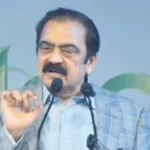An odd statement was posted on X, formerly known as Twitter, on December 8 by the Human Rights Commission of Pakistan (HRCP), an independent non-governmental organization that has been fighting for human rights in the nation for more than thirty years.
“The Human Rights Council of Pakistan (HRCP) uses the handle @HRCPOfficial; the Human Rights Commission of Pakistan (HRCP) would like to clarify that it is in no way associated with that handle,” the HRCP wrote.
The HRCP asserted that it has moral authority over the acronym since its creation in 1986 and urged the organization to desist from using it.
The Human Rights Council of Pakistan, according to Maheen Pracha, the organization’s lead for research and communications, was recently brought to Geo Fact Check’s attention when it abruptly started using social media to promote an award ceremony it held in December.
The unidentified Human Rights Council of Pakistan was asked to stop using the acronym “HRCP” in two public statements released shortly after by the Lahore-based HRCP.
Pracha remarked, “They haven’t responded to us as of yet.”
The “Human Rights Council of Pakistan”—who, what, and where is it?
The Human Rights Council of Pakistan describes itself on its website as a Karachi-based organization that promotes human rights in Pakistan. It also mentions Jamshed Hussain.
Making “the world a better place to live” is advocated in the About Us section, and its goal statement is awkwardly stated.
Human rights are being violated everywhere we look because of someone’s race, creed, caste, or religion. The statement said, “People who are fanatical about these subjects have deprived others of their fundamental rights.”
Its personnel, officer bearers, yearly reports, and financial audit reports are all poorly documented.
Geo Fact Check spoke with human rights advocates and non-profits in the nation, and they were unaware of the existence of Jamshed Hussain.
According to Pracha of HRCP, “Human rights organizations in Pakistan have a very small network. Everyone knows everyone.” However, we were unaware of Mr. Hussain.
With two decades of experience as a lawyer and human rights campaigner in Pakistan, Saroop Ijaz, senior counsel for Human Rights Watch’s Asia Division in New York, also told Geo Fact Check that he was not aware of Jamshed Hussain’s prior work.
Ijaz inquired further as to why certain information was missing from the organization’s website. Ijaz stated that among other things, information regarding a human rights organization’s activities and financing source should be freely accessible in order to foster trust in the organization’s work.
And there are yet more oddities.
The Human Rights Council of Pakistan created an account on X in 2020, but it wasn’t until August 21, 2023, that it uploaded its first post—an announcement on the appointment of its deputy secretary coordinating.
More recently, Pracha found that the Human Rights Council of Pakistan would quickly release a “similar sounding statement” in response to a statement made by the HRCP to draw attention to a human rights violation.
In addition, Pracha reported that she noticed that one political party would typically be favored in the Human Rights Council of Pakistan’s online postings concerning harassment in the lead-up to the general election.
Geo Fact Check discovered that the Pakistan Tehreek-e-Insaf, led by former prime minister Imran Khan, was that political party.
Several of the 1,783 posts that the Human Rights Council of Pakistan has posted since August concern PTI-affiliated politicians.
Although other human rights organizations in Pakistan have also reported on recent instances of state repression directed at the PTI, the Human Rights Council of Pakistan appears to have expressed implicit bias in favor of the party in its remarks, which is inconsistent with the customs of independent and nonpartisan human rights organizations.
For instance, on December 26, it made a post regarding politician Pervez Khattak, who was once a part of the PTI, following rumors that Khattak’s newly formed political party would receive the PTI’s previous election emblem, the “bat.”
“Who gave Pervez Khattak the symbol of the ‘bat’?” The Pakistani people and civil society would like to hear from you, Mr. Pervez,” posted a question on Facebook by the Human Rights Council of Pakistan.
What remarks does the chairperson make?
The chairman of Pakistan’s Human Rights Council, Jamshed Hussain, describes himself as the son of a laborer.
Hussain admitted to having served time in prison over the phone with Geo Fact Check. “After I came out [of prison], I decided there were many [human rights] issues in Pakistan which needed to be highlighted,” Hussain said.
Soon later, on May 16, 2017, Hussain claimed to have registered the “Human Rights Council of Pakistan” as an organization in Karachi in accordance with the Societies Registration Act 1860.
A document that Hussain gave shows that the organization’s certification was extended once more in September, this time through May 15, 2025. The Human Rights Council of Pakistan was also discovered by Geo Fact Check to be a registered organization.
with Sindh’s Directorate of Industries, in accordance with the Societies Registration Act 1860.
Hussain went on to say that the Pakistan Centre for Philanthropy (PCP), a Federal Board of Revenue certification agency, expressed concern about his organization’s name because it sounded too similar to the well-known Human Rights Commission of Pakistan (HRCP) when he applied for registration.
Hussain argued, “Everyone should be able to choose any name they want. We are called council, and they are called commission.” But it’s clear that [HRCP] is a higher ranking than us.
In response to the question of why there was so little information available regarding his organization’s operations, such as annual or audit reports or office bearer biographies, Hussain stated that his organization had between 200 and 300 members.
However, Hussain withheld from Geo Fact Check the addresses of his offices in AJK and KP, as well as the profiles of his office bearers and audit reports, until this report was filed.
He did, however, distribute a fictitious “annual report” for 2022–2023 that his organization supposedly issued via messaging.
Strangely, the 87-page “annual report” is mostly a photo album of conferences and events that the Human Rights Council of Pakistan has sponsored. One such event was a December ceremony where awards were given to numerous Pakistani journalists, including fashion designer Maria B.
The “annual report” also uses text that has been copied verbatim from Human Rights Watch’s 2022 World Report.
Hussain maintains, however, that his organization has been working nonstop to bring attention to human rights abuses in Pakistan and Indian-occupied Kashmir.
He continues, “We try to portray a better image of Pakistan [abroad] even when raising local issues, while also telling the truth of course.”







